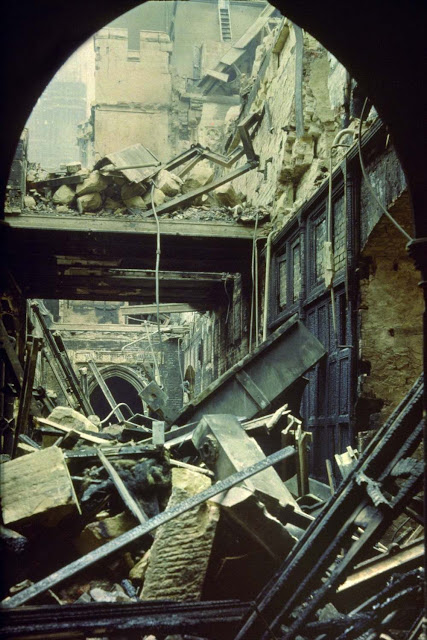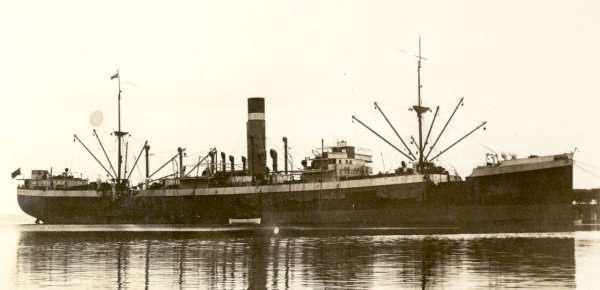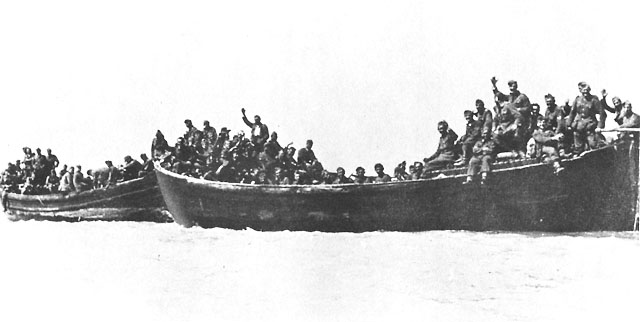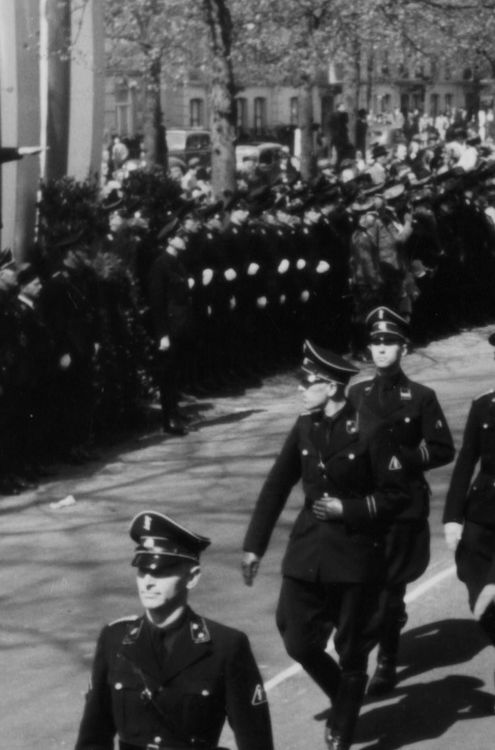Monday 12 May 1941
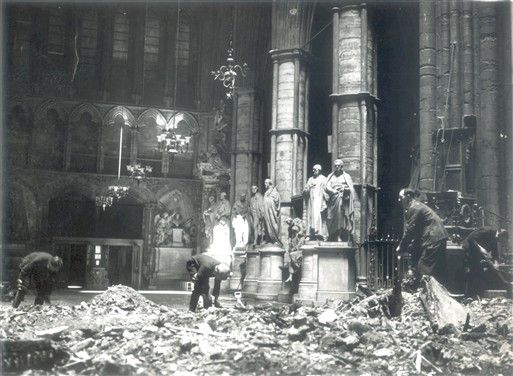 |
| Westminster Abbey after the raids of 10/11 May 1941. |
British reconnaissance planes spot several German aircraft in Iraq.
Joseph Stalin is keeping an eye on the situation in Iraq. The Soviet Union/Russia long has had its eyes to the south. Stalin decides today to recognize the Rashid Ali government.
 |
| A map in the 12 May 1941 Guardian showing flight distances to Reich targets. |
During the day, the Luftwaffe launches standard anti-shipping sweeps by 125 planes in the English Channel. After dark, the Luftwaffe launches scattered attacks on Newcastle and Eshott in Northumberland, Billingham, Stockton, Darlington, North Hylton, Darlington, and Hartlepool in Co Durham and Middlesbrough, Northallerton, Thornaby and Hull in Yorkshire. Billingham, in particular, suffers from an attack on a chemical factory by 19 bombers.
The Reich Press Chief today indicates indirectly that the RAF raids are beginning to affect morale when he cautions broadcasters to:
avoid any sort of cynicism, frivolousness and puerile or brazen expressions in broadcast reports about air raids, which destroy immeasurable cultural, economic and human treasures. This is how we can best live up to the mood in cities like Hamburg and Bremen.He further draws a distinction between different types of citizens - a hallmark of the Third Reich is dividing people up - when he adds gratuitously that "we are fortunate that the bombing raids made on German territory are taking place in the northern part of the Reich" which is populated by "hardy Schleswig-Holsteiners and other Nordic people." Presumably, the slackers in the South would not stand up to the bombings as well. Hitler, incidentally, is from the south. A lot of these subtle regional antagonisms influence Germans throughout the war but are completely missed by outsiders.
In England, Air Marshal John Slessor takes over RAF No. 5 Group of Bomber Command.
East African Campaign: The East African 21st Infantry Brigade captures the Italian position at Alghe in Galla-Sidamo.
The British Indian troops at Amba Alagi prepare another battle to take the Italian stronghold.
 |
| Drum (SS-228), launched today, gets a tug at Portsmouth Naval Shipyard, Kittery, ME, 12 May 1941. |
The Luftwaffe bombs and sinks 4484-ton British freighter Fowberry Tower near the Humber Light Vessel. There are six deaths.
The Luftwaffe bombs and sinks 5358-ton freighter Richard De Larringa in the Tyne. An attempt is made to tow her to port, but she sinks near Hard Sands.
The Luftwaffe bombs and damages destroyer HMS Ripley near Londonderry, but the destroyer continues with her mission.
British freighter Speybank, captured by German raider Atlantis in the Indian Ocean in January 1941, finally arrives at Bordeaux.
Convoy OB 322 departs from Liverpool.
Admiral Günther Lütjens and embarks on battleship Bismarck at Gdynia/Gotenhafen in preparation for Operation Rheinübung, a planned sortie into the Atlantic in the company of cruiser Prinz Eugen.
Corvette HMS Bergamot is commissioned, minesweeping trawler Bute, minesweeper Fraserburgh, destroyer Middleton, corvettes Snowdrop and Stonecrop, and submarines Turbulent and Unbending are launched, and submarine Unrivalled is laid down.
Minesweeper HMAS Whyalla is launched.
Submarine USS Drum is launched.
U-128 (Kptlt. Ulrich Heyse) is commissioned, U-155 is launched, and U-516 is laid down.
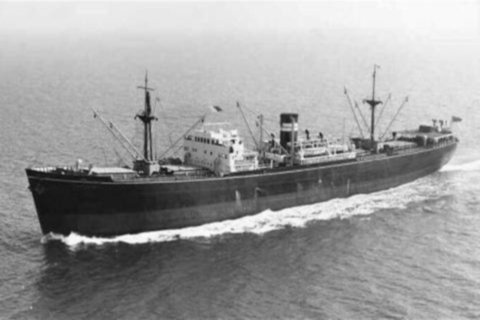 |
| MV Rawnsley, sunk off southeastern Crete and now a popular dive site. |
An Italian convoy of two freighters departs from Tripoli escorted by torpedo boats Clio, Orione, and Pegaso. The torpedo boats attack a submarine, which may be HMS Undaunted, which is lost around this date of unknown causes. There are 32 deaths on the Undaunted.
Royal Navy gunboat HMS Ladybird has given sterling service in support of British ground forces in North Africa. She is bombarding Tobruk during the night when her luck finally runs out. Italian aircraft catch and sink the Ladybird (some sources say these are Luftwaffe Stukas). There are four deaths and 14 wounded. On the bright side for the British, the gunboat settles in only ten feet of water, meaning her guns remain above water level and can remain in operation with the assistance of another ship to provide power. Admiral Andrew Cunningham commends the ship's captain, stating:
Great fighting finish worthy of highest ideals and tradition of the Navy and an inspiration for all who fight on the seas.The Regia Aeronautica (Savoia-Marchetti SM.79 aircraft of 281 Squadron) bombs and sinks 4998-ton British freighter Rawnsley during an attack on Ierapetra Bay, southeast Crete. The wreck has become a very popular dive site.
Royal Navy submarine Rorqual is off Lemnos when it torpedoes and sinks 25 ton Greek freighter Aghios Paraskavi and accompanying schooner. These are transports carrying Wehrmacht troops to garrison Aegean islands.
The Royal Navy command structure in the Mediterranean experiences a shakeup. Among the changes:
- Vice Admiral Pridham Wippell CB, CVO, former Vice Admiral Light Forces => Vice Admiral, 1st Battle Squadron with his flag on battleship Queen Elizabeth
- Rear Admiral E. L. S. King CB MVO => Rear Admiral, 15th Cruiser Squadron with his flag in anti-aircraft cruiser Naiad
- Rear Admiral H. B. Rawlings CBE => Rear Admiral, 7th Cruiser Squadron with his flag in light cruiser ORION.
- Rear Admiral I. G. Glennie => Rear Admiral (D) the Mediterranean with his flag in anti-aircraft cruiser Dido or depot ship Woolwich, if Dido was required at sea as a private ship.
There is a major air raid over Malta around 22:00 and continuing almost to midnight. There is extensive damage to numerous points on the island, including Luqa, Kalafrana, Garden Reach and St. Georges Bay. The Bighi Royal Naval Hospital is badly damaged.
Luftwaffe bomber prisoners are interrogated at Malta and their morale is excellent. They exhibit great confidence in an early victory by the Reich and have great faith in Adolf Hitler.
 |
| "Gunners of the 3rd Battery of the 1st Field Artillery Regiment (1st Polish Corps) hitching their French-built 75mm field gun to a Morris-Commercial C8 'Quad' artillery tractor during an exercise near St Andrews in Scotland." 12 May 1941 (Captain W.T. Lockeyear, © IWM (H 9522)). |
Spy Stuff: Abwehr agent Karel Richard Richter, a Czech sailor with a US girlfriend and son, is dropped by parachute north of London near London Colney. Richter, whose mission is to check on fellow agent Wulf Schmidt, hides in the forest, too afraid to go into London. The police will capture him when he is unable to give directions to a lorry driver.
POWs: Polish Lieutenant Mietek Chmiel and Lieutenant Miki Surmanowicz attempt to escape from Colditz Castle. They contrive to be sent to solitary confinement - usually considered a punishment - and then pick the locks and then climb to the prison roof. This brings them to the attic of the German guardhouse. They then lower a rope and climb down the castle wall. However, while climbing down, their boots make noises against the wall which wake up the German duty officer inside the guardhouse. The German spots them immediately from his window and arrests the escapees in comical fashion, yelling "Hände Hoch" ("hands up") while the two Poles are dangling from a rope dozens of feet above the ground.
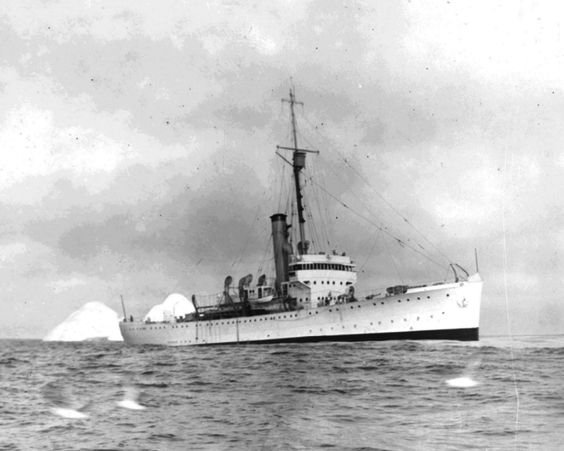 |
| HMS Sennen (Y 21), formerly USCGC Champlain. |
USCGC Champlain (CGC-48) => HMS SennenAll of these ships, as have several in the past, are manned by crew selected from battleship Malaya, which is in New York undergoing major repairs.
USCGC Sebago (CGC-51) => HMS Walney
USCGC Cayuga (CGC-54) => HMS Tortland
US/Australian Relations: Visiting Australian Prime Minister Robert Menzies meets with President Roosevelt. He finds Roosevelt looking older and more tired than he remembers, but still sharp and up-to-date on the war.
US/Japanese Relations: Ambassador Nomura and US Secretary of State Cordell Hull continue their discussions regarding a settlement of claims in the Pacific. Nomura presents Hull with a draft proposal.
German/Vichy French Relations: The Germans invite a select delegation of Vichy French officers to a meeting to discuss participation in Operation Barbarossa.
British Military: Charles Henry George Howard, 20th Earl of Suffolk, 13th Earl of Berkshire, is serving as a volunteer bomb disposal expert when he perishes. The Earl of Sussex is working on a 250 kg (500 lb) bomb dropped some six months earlier in London which had been taken to a "bomb cemetery" in remote Erish marshland when it suddenly explodes. The bomb could have been detonated safely but was being worked on to retrieve its rare Type (17) and Type (50) fuzes for instructional purposes. A total of 13 people in the vicinity perish, including the Earl's private secretary Eileen Beryl Morden and his chauffeur, Fred Hards. One theory is that the Earl's attempt to disarm the bomb triggered a hidden Zus 40 booby trap. It is the 35th bomb the Earl has worked on, and he dies at age 35 and will receive the George Cross.
Winston Churchill will make special mention of this particular incident "as symbolic of the others" in volume 2 ("Their Finest Hour") of his massive "The Second World War." The BBC will televise a biographical series of the Earl's life in 1973 called "The Dragon's Opponent." The Earl of Sussex earlier in the war was a key player in rescuing French nuclear scientists and the entire world stockpile of heavy water from France as it fell to the Wehrmacht in 1940.
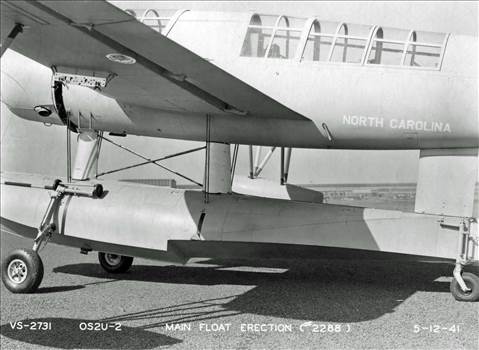 |
| Vought OS2U-2 Kingfisher floatplane, 12 May 1941. |
German Government: Joseph Goebbels meets with Hitler at the Berghof to discuss the Hess affair. After a curiously long delay, the German government issues a formal statement concerning the flight of Deputy Fuhrer Rudolf Hess to Scotland on 10 May. The release ascribes the incident to "hallucinations and a mental disease" in Hess. In addition, it states that all those who assisted Hess are to be arrested, but this is not done - though apparently astrologers, occultists, and clairvoyants are rounded up because Hess supposedly consulted them before making his flight.
Hitler abolishes the post of Deputy Fuehrer and creates instead the new post of Chief of the Party Chancellery (Head of the Parteikanzlei). Martin Bormann, who has been Rudolf Hess's party secretary since 4 July 1933 and has done personal tasks for Hitler such as overseeing renovations at the Berghof in 1935, takes the position. In his new role, Bormann controls access to Hitler in much the same manner that a US President's Chief of Staff does, and in addition, he controls all NSDAP appointments. Due to his ability to restrict access to Hitler even by such Hitler confidantes as Albert Speer and Joseph Goebbels, Bormann instantly becomes one of the most hated figures within the hierarchy of the Third Reich.
In Glasgow, military intelligence officer Ivone Kirkpatrick continues listening to the injured Hess describing the terms of a fantastic peace offer. Hess basically offers peace on Great Britain's terms so as to free the Reich's rear for the real war in the offing in the East. In a carefully memorized statement, Hess claims that he has come "to save humanity."
 |
| Bonneville enrollees at the transportation depot for the Civilian Conservation Corps, 12 May 1941. |
Members of Parliament meet in the House of Lords due to the extensive damage to their own chamber.
Queen Elizabeth sends a very rare note to Churchill from Windsor Castle to offer her "thanks... for his kindness in sending news of the progress and safe arrival of Tiger." She adds, "Any risk was well worth taking," and adds that she is "dreadfully sorry" about the destruction of the House of Commons and Westminster Abbey during the air raid of 10/11 May.
Croatia: Atrocities in Yugoslavia continue as members of Pavelic's Ustaše led by Mirko Puk kills 200-300 Serbs by burning them alive in the Orthodox church in Glina. There is an obvious edge of religious hatred involved in the symbolism of many of these killings.
Philippines: Ernest Hemingway, on a stopover in Manila after a six-week tour of China, briefs the Philippine Department's intelligence (Colonel Joseph O'Hare) and air officer (Colonel Richards) about the military situation in China. Hemingway is coy about the extent of his observations, claiming never to have gotten near any battlefields, but gives an extremely perceptive summary of ongoing and likely events in China. Among his conclusions is that the Chinese Nationalists and Communists soon will be fighting each other as much as they are fighting the Japanese and that Japan at some point will attack the United States. The 4th Composite Group CO, Major Kirley Gregg calls Hemingway "quite an interesting chap," while the 3rd Pursuit Group CO, Major William Maverick, says Hemingway is "a marvelous fellow... a real genius" with a "striking personality."
China: The Battle of South Shanxi continues, with the Japanese North China Front Army capturing Kuangkou, Maotien, and Shaoyuan. The Japanese now have reached their first objective, the north bank of the Yellow River. Elsewhere, the Japanese also continue attacking Tungfeng.
 |
| Life Magazine, 12 May 1941, Hugh Randall, U.S. Army Parachutist. |
May 1941
May 1, 1941: British Hold Tobruk
May 2, 1941: Anglo-Iraq War
May 3, 1941: Liverpool Hammered
May 4, 1941: Hitler Victory Speech
May 5, 1941: Patriots Day
May 6, 1941: Stalin In Command
May 7, 1941: May Blitz
May 8, 1941: Pinguin Sunk
May 9, 1941: U-110 Captured
May 10, 1941: Hess Flies Into History
May 11, 1941: The Hess Peace Plan
May 12, 1941: Tiger Arrives Safely
May 13, 1941: Keitel's Illegal Order
May 14, 1941: Holocaust in Paris
May 15, 1941: Operation Brevity
May 16, 1941: Blitz Ends
May 17, 1941: Habbaniya Relieved
May 18, 1941: Croatia Partitioned
May 19, 1941: Bismarck at Sea
May 20, 1941: Invasion of Crete
May 21, 1941: Robin Moore Sinking
May 22, 1941: Royal Navy Destruction Off Crete
May 23, 1941: Crete Must Be Won
May 24, 1941: Bismarck Sinks Hood
May 25, 1941: Lütjens' Brilliant Maneuver
May 26, 1941: Bismarck Stopped
May 27, 1941: Bismarck Sunk
May 28, 1941: Crete Lost
May 29, 1941: Royal Navy Mauled Off Crete
May 30, 1941: Sorge Warns, Stalin Ignores
May 31, 1941: British Take Baghdad
2020


